东省德州市夏津实验中学初中英语外研版九年级下册Module 1Travel Unit 1 The flight was late 学案.doc
外研版英语九年级下册Module 1 Travel知识点总结

九年级下册(WY)背记本Module 1♦重点词汇1.flight n.航班;飞行2.direct adv.径直地;直接地directly adv.坦率地;径直地;立即3.pilot n.飞行员4.succeed v.成功;做成success n.成功successful adj.成功的succeed in doing sth.成功做某事5.school⁃leaver n.[英]毕业生6.exactly adv.确切地;完全;[口](表示赞同)确实如此exact adj.精确的;准确的;严谨的;严格的7.sir n.先生;长官8.officer n.军官;官员;警察9.stupid adj.笨的;糊涂的10.jacket n.短上衣;夹克11.be full of...充满……12.because of因为;由于13.stay with和……待在一起14.get back to继续(已停止的工作);回去;回到……上15.at the end of...在……结尾;终点16.worry about担忧……17.as long as只要18.look forward to期待19.say goodbye to sb.向某人说再见20.take care (告别用语)多保重21.get on/off上/下(车、船、飞机等)22.look for寻找23.have...ready把……准备好24.take off脱去(衣服等);(飞机等)起飞25.make oneself comfortable使某人自己舒服,不拘束26.offer to do sth.主动提出/要求做某事27.make sure确保;务必28.in time及时on time按时,准时29.see sb.off为某人送行,送别30.too...to...太……以至于……31.decide to do sth.决定做某事32.try to do sth.尽力做某事♦重点句型1.But the pilot succeeded in landing on time.不过飞行员成功地按时着陆了。
山东省德州市夏津实验中学初中英语外研版九年级下册Module 1Travel Unit 3 Language in use 教案 2.doc
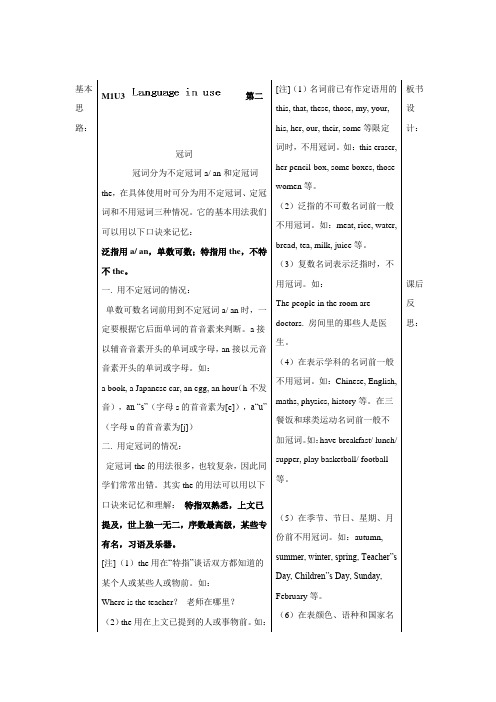
基本思路:M1U3 第二冠词冠词分为不定冠词a/ an和定冠词the,在具体使用时可分为用不定冠词、定冠词和不用冠词三种情况。
它的基本用法我们可以用以下口诀来记忆:泛指用a/ an,单数可数;特指用the,不特不the。
一. 用不定冠词的情况:单数可数名词前用到不定冠词a/ an时,一定要根据它后面单词的首音素来判断。
a接以辅音音素开头的单词或字母,an接以元音音素开头的单词或字母。
如:a book, a Japanese car, an egg, an hour(h不发音),an “s”(字母s的首音素为[e]),a“u”(字母u的首音素为[j])二. 用定冠词的情况:定冠词the的用法很多,也较复杂,因此同学们常常出错。
其实the的用法可以用以下口诀来记忆和理解:特指双熟悉,上文已提及,世上独一无二,序数最高级,某些专有名,习语及乐器。
[注](1)the用在“特指”谈话双方都知道的某个人或某些人或物前。
如:Where is the teacher?老师在哪里?(2)the用在上文已提到的人或事物前。
如:[注](1)名词前已有作定语用的this, that, these, those, my, your,his, her, our, their, some等限定词时,不用冠词。
如:this eraser,her pencil-box, some boxes, thosewomen等。
(2)泛指的不可数名词前一般不用冠词。
如:meat, rice, water,bread, tea, milk, juice等。
(3)复数名词表示泛指时,不用冠词。
如:The people in the room aredoctors. 房间里的那些人是医生。
(4)在表示学科的名词前一般不用冠词。
如:Chinese, English,maths, physics, history等。
在三餐饭和球类运动名词前一般不加冠词。
外研版英语(新标准)九年级下册《Module 1 Travel》教学设计

《英语》(新标准)九年级下册
模块名称
Module1 Travel
教材分析
本模块以“旅行”为中心话题,主要的语言实践活动都围绕此话题而设计。教师要为学生提供自主学习和相互交流的机会,以及充分表现和自我发展的空间。
本模块第一单元的内容是描述假期经历。在描述旅行经历时,让学生讨论自己喜欢的和不喜欢的旅行工具,既为将要学习的对话做好了铺垫,也复习了八年级上册第四模块的内容。因此,本活动起到承上启下的作用。在听力部分,要求学生记录航班信息,这是非常实用的技巧,能帮助学生提升处理实际问题的能力。
2.难点:运用过去时讨论旅行。
教学辅助
多媒体、投影仪、图片和视频
教学策略
交际法、自下而上教学法
教学
内容
教学活动
设计意图
教师活动
学生活动
Step1:
Activity1:导入
1.让学生讨论关于旅行的方式;
2.讨论如下内容,并鼓励2-4对学生在班上分享自己的看法。
A:Do you like traveling?
Step6:
名言警句:
同学们思考和讨论从课文中学到什么,并在全班分享自己的想法。
给出英语谚语,全班猜出意思并跟读。
What can you learn from thestory?
The roses in her hand, the flavor in mine.
赠人玫瑰,手有余香。
本活动旨在渗透正确的价值观,培养学生助人为乐的优秀品德。同时,加深知识的深度和厚度。
There’s nothing to worry about as long as you work hard.
2.能力目标
A.能够理解关于旅行的对话。
2019秋外研版九年级英语下册Module1Travel教案

2.引导与启发:在讨论过程中,我将作为一个引导者,帮助学生发现问题、分析问题并解决问题。我会提出一些开放性的问题来启发他们的思考。
3.成果分享:每个小组将选择一名代表来分享他们的讨论成果。这些成果将被记录在黑板上或投影仪上,以便全班文化差异,培养学生对中华优秀传统文化及世界文化的认识,增强跨文化交际意识。
3.思维品质:通过分析旅行话题,培养学生独立思考、解决问题的能力,激发他们的创新思维和批判性思维。
4.学习能力:帮助学生掌握有效的学习策略,提高自主学习、合作学习和探究学习的能力,为终身学习奠定基础。
(三)实践活动(用时10分钟)
1.分组讨论:学生们将分成若干小组,每组讨论一个与旅行相关的实际问题,如制定旅行计划、选择住宿等。
2.实验操作:为了加深理解,我们将进行一个简单的角色扮演活动,模拟在旅行社咨询旅行计划的场景。
3.成果展示:每个小组将向全班展示他们的讨论成果和角色扮演的结果。
(四)学生小组讨论(用时10分钟)
1.理论介绍:首先,我们要了解旅行的基本概念。旅行是人们为了休闲、工作或其他目的,暂时离开日常生活的地方,去到其他地方的活动。它是了解不同文化、拓宽视野的重要方式。
2.案例分析:接下来,我们来看一个具体的案例。这个案例展示了如何制定旅行计划,以及旅行中可能遇到的问题和解决方法。
3.重点难点解析:在讲授过程中,我会特别强调描述旅行计划的词汇和句型,以及现在进行时和将来时的用法。对于难点部分,我会通过举例和比较来帮助大家理解。
2019秋外研版九年级英语下册Module 1 Travel教案
一、教学内容
外研版英语九年级下册《module 1 travel》优秀教案(重点资料).doc

Because of
Etc
Some phrases in this unit
Have a good holiday
Fly back
At the end of
Plenty of
Etc.
教学后记
课时备课表(教案)
课题
Module1 Unit 2(1)
课型
Reading and learning
能力目 标
Use the points of this unit very freely.
情感目标
Get the students to enjoy the scenery of the nature.
内容
分析
重点
The words, useful expressions and the grammar.
Step6:Homework for today
《中华一题》
Recite all the points in this unit, getting ready for the dictation tomorrow.
Get the students to talk about the transports and then ask them“Which one do you like most/least?“Which one do you use most often/least often?”and so on. And know the reasons according to their answers.
Step4:Reading
Step5:Explaining
Step5:Pronunciation and speaking
外研版九年级英语下册全册教案:Module 1 Travel 教案
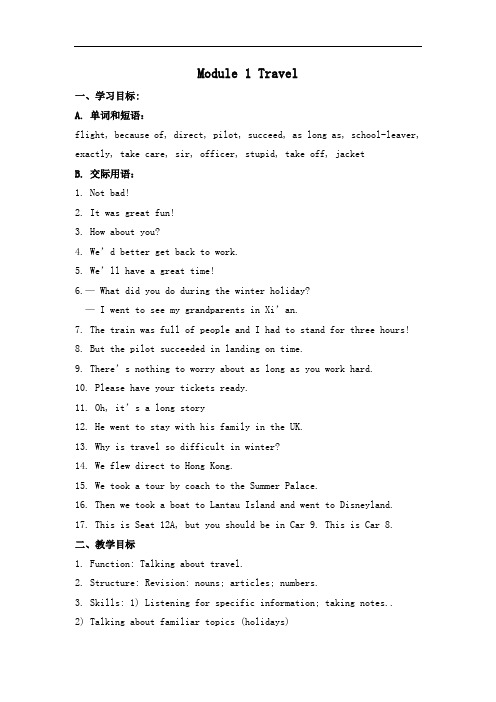
Module 1 Travel一、学习目标:A. 单词和短语:flight, because of, direct, pilot, succeed, as long as, school-leaver, exactly, take care, sir, officer, stupid, take off, jacketB. 交际用语:1. Not bad!2. It was great fun!3. How about you?4. We’d better get back to work.5. We’ll have a great time!6.— What did you do during the winter holiday?— I went to see my grandparents in Xi’an.7. The train was full of people and I had to stand for three hours!8. But the pilot succeeded in landing on time.9. There’s nothing to worry about as long as you work hard.10. Please have your tickets ready.11. Oh, it’s a long story12. He went to stay with his family in the UK.13. Why is travel so difficult in winter?14. We flew direct to Hong Kong.15. We took a tour by coach to the Summer Palace.16. Then we took a boat to Lantau Island and went to Disneyland.17. This is Seat 12A, but you should be in Car 9. This is Car 8.二、教学目标1. Function: Talking about travel.2. Structure: Revision: nouns; articles; numbers.3. Skills: 1) Listening for specific information; taking notes..2) Talking about familiar topics (holidays)3) Predicting; reading for specific information .4) Writing a short play about a trip.4. Around the world: The first pilot to fly alone across the Atlantic Ocean.5. Task: Writing and acting out a short play.三、重点及难点:Grammar: Revision: nouns; articles; numbers.四、教学设计:Unit 1 We toured the city by bus and by taxi.Ⅰ Teaching modelListening and speakingⅡ Teaching methodCommunicative approachⅢ Teaching aims1. To understand the conversations conversation with regard to “travel”.2. To talk about one’s holiday and new term..Ⅳ Teaching Objectives1. Key vocabulary: flight, because of, direct, pilot, succeed, as longas, school-leaver, exactly2. Key structures: Sentence structureⅤ Teaching aidsTape recorder, OHP, videoⅥ Teaching StepsStep 1 Warming up1. Show some pictures to talk.1) — How do you go to school / work?— I go to school by ______.2) — How do you most like to travel by?— I most like to travel by _________.2. Enjoy and talk something about the pictures.3. Show some pictures to introduce the new words.4. Learn the new words.5. Read the words after the teacher.Step 2 Complete the sentences.1. Ask the students to read through the sentences in Activity 1.1) I most like to travel by _____________.2) I least like to travel by _____________.3) I travel most often by ______________.4) I travel least often by ______________.2. Complete the sentences so they are true for you.3. Ask the students to check their answer with a partner.4. Call back the answers from the whole class and check the answers. Step 3 Listening practice.1. Ask the students to read through the sentences in Activity2.1) The flight takes about __________ hours.2) Time difference: __________ hours.3) Flight number: __________4) From _________ to _________5) Leave at (new time): _________6) Arrive at (new time): _________Keys: 10, 8, CA938, London, Beijing, 11:30, 5:30 p.m.2. Play the tape and ask the students to listen to the tape carefully.3. Listen and complete the notes.4. Ask the students to check their answer with a partner.5. Call back the answers from the whole class and check the answers. Step 4 Listen and read.1. Ask the students to listen and read the conversation silently.When you listen to the recording, try to note down the key information. Your notes will then help you retell the main information.2. Now complete the table.Holiday activitiesLingling went to see her grandparents in Henan Province by train TonyDamingBetty4. Ask the students to check their answer with a partner.5. Call back the answers from the whole class and check the answers. Keys:went to stay with his family in the UK by plane.flew to Hong Kong and visited Lantau Island Disneyland.toured Beij ing by bus and by taxi and took a tour by coach to the Summer Palace.Step 5 Answer the questions.1. Ask the students to read through the questions in Activity 4.1) When do you think the conversation takes place?2) According to Lingling, why is travel so difficult in winter?3) What are Daming and Betty looking forward to at the end of the term?2. Answer the questions.3. Ask the students to check their answer with a partner.4. Call back the answers from the whole class and check the answers. Keys:1. The conversation takes place in winter.2. Travel is difficult because of the Spring Festival.3. They are looking forward to the school-leavers’ party.Step 6 Choose the correct answer.1. Ask the students to read through the words in the box in Activity 5.direct exactly pilot succeed2. Choose the correct answer.1. When you fly direct, you ______.a) arrive without stopping at another placeb) stop at another place before you arrive2. When you say “Exactly”, it means ______.a) you do not agreeb) you completely agree3. The pilot of plane ______.a) flies itb) gives you food and drink during the flight4. If you succeed in doing something, you ______.a) manage to do itb) nearly do it3. Ask the students to check their answer with a partner.4. Call back the answers from the whole class and check the answers. Keys: 1. a 2. b 3. a 4. aStep 7 Everyday EnglishNot bad!It was great fun!How about you?We’d better get back to work.We’ll have a great time!Step 8 Pronunciation and speaking: Listen and mark the pauses.1. Play the recording once without stopping.2. Play the recording again and ask the whole class to repeat. Lingling: How about you, Betty?Betty: We had quit a good time in Beijing. We toured the city by bus and by taxi. Last weekend, we took a tour by coach to the Summer Placeand went for a long walk around the lake.Lingling: That sounds great! But now, we’d better get back to work . We’re going to have a big exam at the end of the term.3. Ask the students to listen and mark the pauses.4. Now listen again and repeat.Step 9 Work in groups.Talk about your winter holiday.1. Ask and answer about what you did during the winter holiday.— What did you do during the winter holiday?— I went to see my grandparents in Xi’an.2. Talk about what happened during the trip.The train was full of people and I had to stand for three hours! Step 10 Language points1. But the pilot succeeded in landing on time. 不过飞行员成功地按时着陆了。
外研版英语九年级下册《Module 1 Travel》教学设计

外研版英语九年级下册《Module 1 Travel》教学设计一. 教材分析外研版英语九年级下册《Module 1 Travel》主要介绍了旅游的主题。
通过本模块的学习,学生能够掌握关于旅游的相关词汇和表达方式,了解不同国家的旅游特色,提高他们的语言运用能力和跨文化交际意识。
本模块包括三个单元,每个单元都包含听、说、读、写等方面的内容,旨在全面提高学生的英语素养。
二. 学情分析九年级的学生已经具备了一定的英语基础,对于日常生活中的词汇和表达方式有所了解。
但是,对于旅游这一主题的专业词汇和表达方式可能较为陌生。
因此,在教学过程中,需要帮助学生建立起旅游主题的词汇体系,同时引导他们运用已有的英语知识来表达关于旅游的内容。
三. 教学目标1.知识目标:学生能够掌握关于旅游的相关词汇和表达方式,了解不同国家的旅游特色。
2.能力目标:学生能够运用英语进行旅游主题的听、说、读、写活动,提高他们的语言运用能力。
3.情感目标:通过学习本模块,学生能够培养对旅游的兴趣,提高他们的跨文化交际意识。
四. 教学重难点1.重点:旅游主题的词汇和表达方式的掌握。
2.难点:如何运用英语进行旅游主题的听、说、读、写活动,以及跨文化交际能力的培养。
五. 教学方法1.交际法:通过模拟真实的旅游场景,引导学生进行听、说、读、写活动,提高他们的语言运用能力。
2.任务型教学法:通过完成旅游相关的任务,激发学生的学习兴趣,培养他们的跨文化交际意识。
3.情境教学法:通过创设旅游情境,帮助学生理解和运用旅游相关的词汇和表达方式。
六. 教学准备1.教材:外研版英语九年级下册《Module 1 Travel》。
2.多媒体教学设备:用于展示旅游相关的图片、视频等材料。
3.旅游卡片:用于模拟旅游场景的听、说、读、写活动。
4.旅游小故事:用于激发学生的学习兴趣和跨文化交际意识。
七. 教学过程1.导入(5分钟)利用多媒体展示不同国家的旅游景点,引导学生进行观察和思考,激发他们对旅游的兴趣。
外研版九年级英语下册Unit1 《Model1 Travel Unit 3》精品课件.ppt
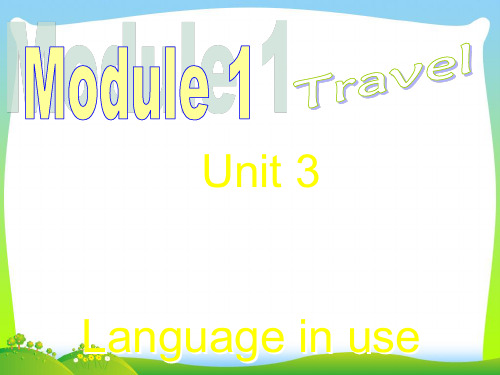
9 Work in groups. Talk about your recent travel experience. Say:
• how you travelled • how long the journey took
• how you felt about it
Now write a passage about your experience.
Sydney to London
Sydney – London: ___2_4_
hour(s)
Hong Kong — Sydney
____9___ hour(s). From airport to centre of Price of flight: £_1_,_1_1_9 Hong Kong: ___1__ hour(s).
7 Read the passage and complete the table.
Advantage of Concorde
Disadvantage of Concorde
• fly fast • carry more
people
• noisy bad for the environment
hurt people’s ears
用名词的正确形式填空
kilometres
Work in pairs. Look at the notes you have made in Activity 5. Talk
about:
Which flight takes a longer time? Which flight is more expensive?
Do you like travelling by plane? Why? Talk about some advantages and
九年级英语下册 Module1 Travel重难点讲解 外研版
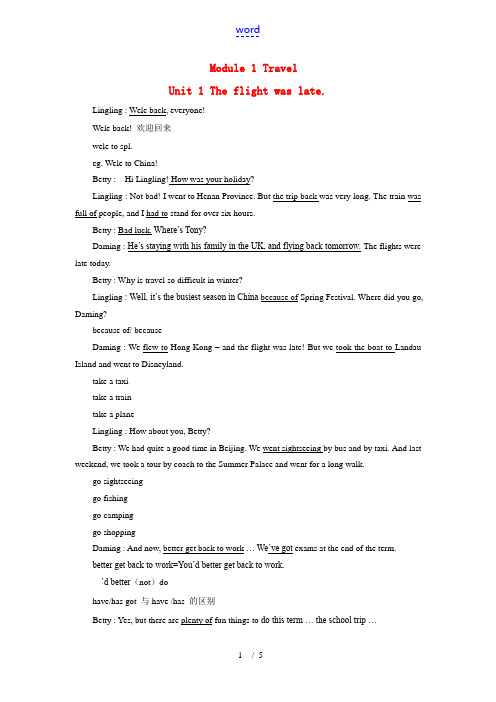
Module 1 TravelUnit 1 The flight was late.Lingling : Wele back, everyone!Wele back! 欢迎回来wele to spl.eg. Wele to China!Betty : Hi Lingling! How was your holiday?Lingling : Not bad! I went to Henan Province. But the trip back was very long. The train was full of people, and I had to stand for over six hours.Betty : Bad luck. Where’s Tony?Daming : He’s staying with his family in the UK, and flying back tomorrow. The flights were late today.Betty : Why is travel so difficult in winter?Lingling : Well, it’s the busiest season in China because of Spring Festival. Where did you go, Daming?because of/ becauseDaming : We flew to Hong Kong – and the flight was late! But we took the boat to Landau Island and went to Disneyland.take a taxitake a traintake a planeLingling : How about you, Betty?Betty : We had quite a good time in Beijing. We went sightseeing by bus and by taxi. And last weekend, we took a tour by coach to the Summer Palace and went for a long walk.go sightseeinggo fishinggo campinggo shoppingDaming : And now, better get back to work … We’ve got exams at the end of the term.better get back to work=You’d better get back to work.---’d better(not)dohave/has got 与have /has 的区别Betty : Yes, but there are plenty of fun things to do this term … the school trip …plenty of =a lot of=lots of 既可以修饰可数名词,又可以修饰不可数名词eg. I have plenty of reasons to refuse him.We have plenty of water to drink.Lingling : … and the school leavers’ party …Daming : … the visit to the English-speaking theat re in Beijing …Lingling : And our trip to Los Angeles! We’ll have a great time!Unit 2 You’re sitting in my seat.Excuse me, you’re sitting in my seat.The train to Beijing! Lin often dreamed about the train, and about going to the capital. Now it was in front of him, to set off soon. He looked at his brother.dream of/ about + 名词,代词/ V-ing“梦到,梦见,梦想eg. The girl dreamt about her mother last night.The boy dreams about/ of being a pilot.dream +名词,代词/ that从句eg. I dreamt a dream just now.I never dreamt that he was such a person.in front of/ in the front ofset off“出发、动身”=set outeg. We’ll set off as soon as he es back.They set out in search of the lost child.补充:set about 着手做set up 搭起,建起set free 释放“ Don’t forget where you e from, little brother , ” Jin said. “And watch your bags carefully.”Lin nodded, unable to speak. This was his first long trip by train at the start of his new life, leaving his village and his home for the last 16 years.unable to speak,形容词短语,作状语,说明点头时的状态eg. The little girl ran back home, happy and joyful.He stood there, cold and hungry.be(un)able to doat the start of = at the beginning ofHe held Jin in his arms. With tears in his eyes, Jin pushed Lin away. “Go, brother. Write to us as soon as you get there, OK?”with + 名词+介词短语eg. A stranger broke into the bar, with a gun in his hand.with + 名词+副词eg. He fell asleep on the sofa, with the TV on.with +名词+ 不定式短语eg. With so much homework to do, he can’t go out to play.with +名词+V-ingeg. With so many people ing in and out, I just can’t get to sleep.with+ 名词+过去分词短语eg. The thief was taken to the police station, with his hands tied behind.As soon as he es, I’ll tell him about it.Lin jumped onto the train. There were people and bags everywhere. He pushed past them towards his seat.past/ passA young man was sitting in Lin’s seat. He was wearing jeans and a very smart jacket, and was smoking a cigarette.What should he do? Six pairs of eyes looked at Lin, while the man looked out of the window.“Sir, you’re sitting in my seat,” Lin said, with a nervous smile. The other people watched with interest.with interest 作状语eg. The children are listening to a story with interest.eg. With no doubt/ Without doubt, our team will win the game.The man didn’t turn to look at Lin, but just looked out of the window.turn to do 转身去做某事eg. He knew what was going on behind him, so he didn’t turn to look.“Excuse me, I have a ticket with the number of the seat you’re sitting in!” Lin said in a stronger voice.eg.This is a sleeping bag that a soldier sleeps in.This is the life he has always dreamt of.She is the person you must take care of.in a …voiceeg.The little girl has a sweet voice.He is not in good voice.noise, sound, voice“I also have a ticket with that number – though it is in another car. Besides, I was here first,” said the man, without moving his head. Though he was sitting, he looked very tall and strong.besides /excepteg.We all went to the concert except Jim.There were many others at the concert besides us.Lin looked at the other passengers for help. “But …” he started to say.“But what?” The man turned and looked at Lin. “I’m not moving.”Finally a man wearing glasses spoke in a loud voice. “This young man has the right ticket for that seat. You should move.”V-ing 短语作定语,放在名词后面eg. They have heard the exciting news.Ving 作定语,放在名词前面eg. They have heard the exciting news.Lin felt brave. “See? Please move. I’ve got a long way to go.”have got a long way to go=have a long way to goeg. You must have a good sleep. T omorrow we’ll have a long way to go.引申义:You’ve got a long way to go before you bee a pop star.“How long?” the young man asked.“To the last stop, Beijing.”“I’m getting off before you. Then you can have my seat.”get off——get onget into——get out of“Where is that?” asked Lin.“Hangzhou.”Lin thought Hangzhou was far away.“It’s seven hours away from here,” the man with glasses said. “Even if it’s only 10 minutes, you should move.”Slowly the young man stood up, dropped his cigarette on the floor, and disappeared down the train.【典型例题】1. It’s cold outside. You’d better ______ your warm clothes, Lucy.A. put onB. to put onC. putting onD. put2. Does John know any other foreign language ________ French?A. exceptB. butC. besidesD. beside3. They had learned 2300 words_________ last week.A. in the endB. by the endC. at the end ofD. by the end of4. I will ________ the train at Beijing Station. Then you can have my seat.A. take offB. get offC. set offD. put off5. This dress still looks pretty on you, _________ it is out of style.A. thoughB. butC. in spite ofD. because of6. His son went through the door, _______ a basketball in his hand.A. inB. onC. withD. at7. I sit _______ the classroom so that I can hear clearly.A. in frontB. in the frontC. in front ofD. in the front of8. ________ books are there; ________ books is 300.A. The number of; a number ofB. A number of; a number ofC. The number of; the number ofD. A number of; the number of9. Beijing is _________ beautiful city.A. very aB. veryC. a quiteD. quite a10. Though he isn’t good at English, he doesn’t want to _________.A. give up itB. give off itC. give it upD. give it off答案:1—5 ACDBA 6—10 CDDDC。
外研版英语九年级下册-Module 1 Travel Unit 1 教案设计
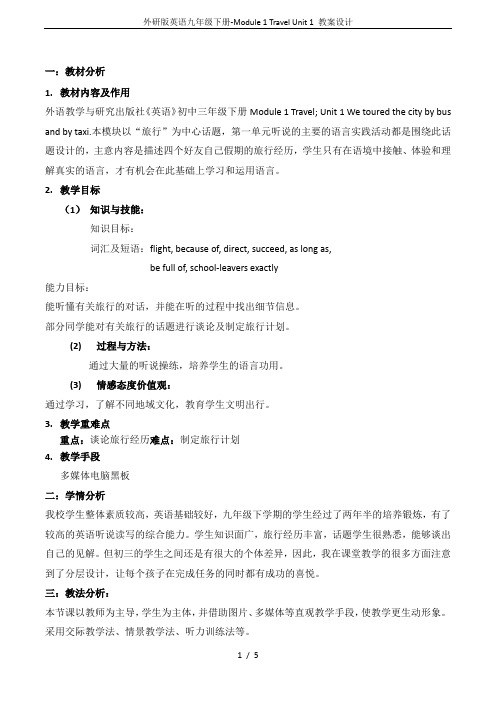
一:教材分析1.教材内容及作用外语教学与研究出版社《英语》初中三年级下册Module 1 Travel; Unit 1 We toured the city by bus and by taxi.本模块以“旅行”为中心话题,第一单元听说的主要的语言实践活动都是围绕此话题设计的,主意内容是描述四个好友自己假期的旅行经历,学生只有在语境中接触、体验和理解真实的语言,才有机会在此基础上学习和运用语言。
2.教学目标(1)知识与技能:知识目标:词汇及短语:flight, because of, direct, succeed, as long as,be full of, school-leavers exactly能力目标:能听懂有关旅行的对话,并能在听的过程中找出细节信息。
部分同学能对有关旅行的话题进行谈论及制定旅行计划。
(2) 过程与方法:通过大量的听说操练,培养学生的语言功用。
(3) 情感态度价值观:通过学习,了解不同地域文化,教育学生文明出行。
3.教学重难点重点:谈论旅行经历难点:制定旅行计划4.教学手段多媒体电脑黑板二:学情分析我校学生整体素质较高,英语基础较好,九年级下学期的学生经过了两年半的培养锻炼,有了较高的英语听说读写的综合能力。
学生知识面广,旅行经历丰富,话题学生很熟悉,能够谈出自己的见解。
但初三的学生之间还是有很大的个体差异,因此,我在课堂教学的很多方面注意到了分层设计,让每个孩子在完成任务的同时都有成功的喜悦。
三:教法分析:本节课以教师为主导,学生为主体,并借助图片、多媒体等直观教学手段,使教学更生动形象。
采用交际教学法、情景教学法、听力训练法等。
四:学法指导:培养学生深入探讨话题的交际能力以及听说技能。
五:设计的基本理念:根据新课标培养学生自主、合作、探究精神,突出语言运用能力的理念而设计。
尊重学生已有知识,帮助建构新知识。
教学过程中突出听说课的特点,以各种教学方法激发学生的兴趣,提高学生的参与能力和学习积极性,让学生在轻松愉快的环境中学英语。
外研版初中英语九年级下Module-1《Travel》教案 表格版

Step1:Have a dictation
Get the students to write the importances in unit
1 ,check them if they have grasped the usages of
the points.
Step2: Looking through
have any question, they can ask the teacher right now.
Step6:Homework for today 《中华一题》 Recite all the points in this unit, getting ready for the dictation tomorrow.
answers
out the answers to them in the passage.
Then check their answers.
Step4:Reading
Teamwork: Listen to the tape first, then underline the importances, translate the passage and explain the difficulties to each other with your partners.
most/least? “Which one do you use most
教 学
often/least often?” and so on. And know the
程
序
reasons according to their answers.
Step2:Listen and answer(Activity Read the words in the yellow box together,
- 1、下载文档前请自行甄别文档内容的完整性,平台不提供额外的编辑、内容补充、找答案等附加服务。
- 2、"仅部分预览"的文档,不可在线预览部分如存在完整性等问题,可反馈申请退款(可完整预览的文档不适用该条件!)。
- 3、如文档侵犯您的权益,请联系客服反馈,我们会尽快为您处理(人工客服工作时间:9:00-18:30)。
Teaching aims:1、知识目标:(1) 词汇:by coach, transport, full of, because of , fly to, go sightseeing, plenty of, least,most.(2) 句型:①How was your holiday? ②Better get back to work③What has happened?(3) 语法:名词、冠词和数词2、能力目标:能听懂谈论交通旅行方面的话题,能以How was your holiday? What did you doduring your holiday? 等为话题展开对话。
3、情感目标:谈论旅行,品味人生,树立更高的人生价值目标。
Teaching keys:1)Better get back to work,by coach,2)语法:名词、冠词和数词Teaching difficulties: 语法:名词和数词☆☆☆知识点拨-:一.Key words:1.coach , n,意为“(尤指长途)公共汽车,客车;教练,”乘长途公共汽车:by coach, take a coachv,意为“训练,指导”相当于train 或teachHe coaches me to swim on Sundays. 他每逢星期天教我游泳。
e.g 1) --- I don’t want to take the plane. I’m afraid of it.--- You can go by c__________. It takes longer but safer.2)Sun Haiping is one of the most experienced c_________..(孙海平是最有经验的教练之一)3) I like taking c________ less , because they’re too slow.2. transport n「U」运输,交通方式,交通。
e.g 1) Do you have your own transport? 你有自己的交通工具吗?【联想辐射】means of transport 交通工具;交通方式,相当于form of transportE.g 1) The bike is his only means of t___________.2) In our city, the traffic is always busy. We’d better go by public t_____.3.departure n 出发,启程,航班,车次。
e.g What is the departure time? 何时启程?二.Key sentences :1. The train was full of people, and I had to stand for over six hours.【解析】1) be full of ( full 为形容词) = be filled with其中full of 除了做表语,还可状语和后置定语2)fill … with…把…装满(fill 为动词)e.g 1) Her eyes were full ____ tears when she heard the bad news.A. withB. ofC. inD. at2) He dreams about a world ___________ love and friendship.他梦想一个充满友爱的世界2. Why is travel so difficult in winter?【帮你归纳】1) so 是副词,用来修饰形容词、副词。
即:①so + adj \ advso 还可以修饰名词。
即:②so little \ much + 不可数n③so + few \ many + 可数复数n④so + adj + a \ an + 可数单数n2) such 是形容词,意为“这(那)样的,如此的。
用法:①such + a\an + adj + 单数n②such + adj + 复数n或不可数ne.g 1)The film kung Fu Panda is _ interesting _I would like to see it again.A. such, thatB. too, toC. as, asD. so, that2) Tom is too young to join the army (同义句)→Tom is _____ young _____ he can’t join the army3) we are busy because we have so ____ housework to do today.A. fewB. littleC. manyD. much3. And now, better get back to work.【解析】本句中,better前省略了we had. 完整的句子应为:And now, we had better get back to work….★had better do sth , 意为“最好做某事“,可用It’s better\ best to do sth句型来替换。
had betterdo sth常用于提出建议或忠告;★had better not do sth, 意为“最好不做某事”e.g 1) You’d better _______ (not send) the letter tomorrow.2) You ____ _____ _____ ______ to Jinan.你们最好乘坐公共汽车去济南4. Yes, but there are plenty of fun things to do this term…【解析】plenty of 既可以修饰可数名词又可以修饰不可数名词,其同义词组是a lot of 和lots of . plenty of 通常只用于肯定句中,在疑问句中一般用enough,在否定句中用many 或much.e.g There’s _____ ______ _______ here in summer.这里夏天多雨当堂达标一、根据句意和首字母提示完成单词。
1. – I don’t want to take the plane, I’m afraid of it.--- You can go by c_________. It takes longer but seems safer.2. A lot of passengers are waiting in the departure l________ because of terrible weather.3. There is no time. I will go there by a________.4. --- What form of t_________ are you going to take?--- The train.5. We went s________ by bike last weekend, and we had a great time.6. If I had p_____ of money, I was able to help her.二、选择填空1.The shop ____ people at weekends.A. full ofB. be full ofC. is full withD. is full of2. My father told me a story last night. It is ____ one I’ve ever heard.A. the funnierB. the funniestC. funnierD. funniest3.You’d better ____ too much time playing computer games.A. don’t spendB. not to spendC. to not spendD. not spend4. Many people lost their lives ____ the great earthquake.A. instead ofB. becauseC. because ofD. thanks to5. Don’t worry. There’s ____ food for everyone.A. a fewB. manyC. a lotD. plenty of6. ---- Did you enjoy yourself during the summer holiday?---- Yes, we had _____ in Beijing.A. a quite good timeB. quite a good timeC. very a good timeD. very good time.7. Lucy said that she hadn’t heard _____ music before.A. such a beautiful piece ofB. a beautifulC. so beautiful aD. such a wonderful三、用词的适当形式填空1.Would you like to come to the school _______ (leave) party?2. The Greens __________ (fly) back to England tomorrow.3. Better _______ (leave) at once, or we’ll be late.4. The students went ______ (sightsee) last week.5.Great changes ______ (take) place in my hometown in the last 20 years.能力提升一、根据汉语提示完成句子。
1. They _________________ Hong Kong yesterday.昨天他们坐飞机去了香港。
2.We had to put off the sports meeting ______________________.因为下大雨我们不得不推迟运动会。
3.The bottle _____________________ water.这个瓶子里装满了水。
二.综合填空Dear Alice,I am back in Brighton now after a great holiday with Rose in Dublin. I really had a good(1)t__________.We travelled (2)b_______ train and boat. I hated the boat journey. I tried to sleep. But it was very difficult. We were (3)b_______ very tired when we arrived, but her parents ere kind. We (4)s_________ with them for two weeks and they cooked lovely meals for us. I practiced my English(5) a _______ the time.We visited Rose’s friends and also (6)s________ of Dublin’s beautiful buildings. The old building was closed, (7)s________ we didn’t go in. We just looked at it outside. I liked the university very much. What a great (8)p__________ to study! I also loved the clubs(9)w________ their music and friendly atmosphere. The weather was bad--- it was very wet, but everything (10)e______ was wonderful.See you when you come back to Brighton.Love,Maria三、动词应用(必要时加助动词或情态动词)。
